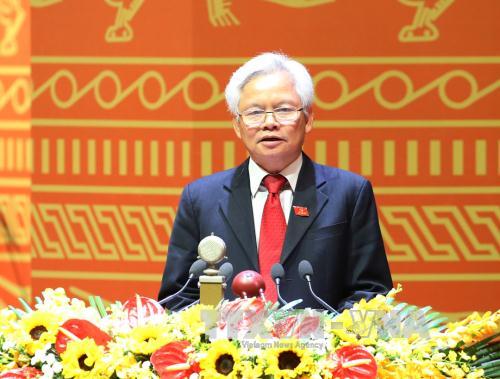.jfif) Opinion
Opinion

Professor Tạ Ngọc Tấn, Deputy Chairman of the Theoretical Council of the Communist Party of Việt Nam’s Central Committee, talks to Việt Nam News about how the Party has implemented President Hồ Chí Minh’s testament in its development resolutions.

|
| Professor Tạ Ngọc Tấn. — VNA/VNS Photo |
Professor Tạ Ngọc Tấn, Deputy Chairman of the Theoretical Council of the Communist Party of Việt Nam’s Central Committee, talks to Việt Nam News about how the Party has implemented President Hồ Chí Minh’s Testament in its development resolutions.
Last year marked the 50th year of President Hồ Chí Minh’s Testament. Do you think what he wrote can be applied in the country today
The testament of President Hồ Chí Minh comes from his life and revolutionary leadership experience that he passed on to the Party and the people. It is long-lasting. The testament contains guidance for the Party but also his hopes and desires. There are things that are not only meaningful for a certain period of time because they last forever. For example, keeping unity within the Party, human resources training, taking care of people and treasuring international friends.
How has the Party implemented President Hồ Chí Minh’s Testament?
President Hồ Chí Minh’s Testament includes his important ideas and methodology, which were “firm in objectives, and flexible in strategies and tactics”. When our Party has thoroughly grasped that methodological thought, with the right and rational approach, it is clear that we can build and develop the Party successfully.
For example, the Party initiated and adopted the đổi mới (renewal) process in 1986. The renewal of thinking meant looking straight for the truth, which is very important. It helps the Party avoid a conservative and bookish way of thinking to apply in reality. It is a way of applying Marxist ideas with the reality of the Vietnamese revolution. This is the basis for the remarkable victory of our Party and State today, and the great achievements of the đổi mới process.
Let’s take an example: from changing the way of thinking about the transitional period, he also led the change in the way of thinking about economic development. We have progressed from a subsidised economy to an economy of different components of ownership, recognising the private economy under the management and leadership of the Party. It has helped create a driving force for the movement and development of our economy, from agriculture to industry, leading our developments today. GDP per capita from just US$90 per capita in 1986 has steadily increased to now more than $3,000 per capita. Those are miraculous developments that not all countries have achieved. From the devastation after a fierce war lasting 30 years, we we are seeing a country that is prosperous and wealthy.
Does this mean the Party has followed the directions President Hồ Chí Minh set?
Yes, exactly.
Forming policies for social and economic development, improving people's lives and building a beautiful country follow the exact wishes of President Hồ Chí Minh.
Socialism, according to President Hồ Chí Minh, was very simple as people are independent, with good living standards and education. These were his utmost wishes. What we have achieved today is exactly what President Hồ Chí Minh wished.
What are the shortcomings we need to overcome?
Any policy can have its downsides and any development also entails limitations. For example, the rapid development of the country in terms of the economy and technology has led to limited awareness of culture. For example, the development of technology has led to hi-tech crime and pollution. The important thing is to recognise these downsides to form appropriate policies and solutions to achieve better results.
President Hồ Chí Minh’s Testament highlights the Party’s culture. How important is that?
The Party's culture is rooted in ideology and morality. What is communist morality? How aware of the role of communism plays among the people? It manifests itself as a way of life, the way of living closely with people, respecting the people, and sharing with the people. We're talking about conduct and what benefits the people, while avoiding harm. That is the Party’s culture. If you do the wrong thing, you have to take responsibility. If you do the right thing, you should continue to do so.
That is the fundamental and cultural core of the Communist Party. Now we are doing those things. And now there's even a set of rules for us to make sure that the Party is well-shaped. For example, regulations setting an example for Party cadres must set an example by living cleanly for the country. Then there is a rule on abuse of power for personal benefit. Controlling power among cadres is the most sensitive area as it can lead to harassment and negativity.
Together with President Hồ Chí Minh’s Testament, the Party has promoted the campaign to follow President Hồ Chí Minh’s moral example. How would you describe the President’s morals?
The most important example of President Hồ Chí Minh's morals is to live for the revolution, for the goal of national independence, freedom and happiness. This is an exemplary example of President Hồ Chí Minh’s whole-hearted endeavour as well as the common ideology. Now the entire Party is educating cadres and Party members in these matters. — VNS




